Victoria plans to hire an American non-profit agency to help smooth out potential conflicts between a vibrant nightlife and a growing downtown residential sector.
“Downtown is more vibrant and alive than ever,” said Mayor Lisa Helps. “There are cranes on every corner with new people moving into the downtown. We’re seeing small-scale entrepreneurship really taking hold in the downtown in these creative late-night places.”
The tech sector is the main industry downtown, she said, and few people in the sector work 9 to 5. “They deliver their software that’s due in China and it happens to be midnight and they want to go have a good meal somewhere.”
To help develop a new municipal alcohol policy, the city has hired the California-based Responsible Hospitality Institute, at a cost of $25,000. The goal is to balance the needs of the hospitality industry with the well-being of residents.
“Really, it’s to respond to the enormous vibrancy we’re seeing in the downtown, both in terms of businesses, late-night economy and residences,” Helps said.
City spokesman Bill Eisenhauer said the institute is seen as an international leader in its field. The city’s purchasing policy allows for a direct award of a contract instead of going to tender “when a supplier clearly provides the best value to the city in the circumstances of a particular purchase,” Eisenhauer said.
The policy will provide guidelines for alcohol service at city facilities, parks and public spaces, improve safety and security for patrons, encourage healthy alcohol-consumption levels, manage the impact of downtown nightlife for residents, and support a thriving late-night economy.
Councillors were recently told the city spends about $255,000 a year on downtown late-night initiatives, the bulk of which funds four special duty officers on Friday and Saturday evenings.
Coun. Ben Isitt said the city should consider reducing its late-night costs by recovering additional revenue from operators “who profit off the drunkenness that causes the disorder that necessitates this program.”
Isitt wants the city to look for ways to strengthen regulations to reduce anti-social behaviour resulting from over-serving and over-consumption of alcohol.
The city’s $371-million late-night economy employs 3,262 people. Staff say city annual revenues from liquor licensing total $121,161, $50,373 from food primary licences and $70,788 from liquor primary licences.
Victoria’s strategic plan calls on the city to create a safe nightlife campaign for city venues, bars clubs and festivals to help end sexual harassment.
Councillors endorsed a suggestion from Coun. Laurel Collins that city staff contact organizations such as the May I Project, the Retail Action Network and the Good Night Out project and to connect with marginalized communities and the LGBTQ community to participate in the city’s Late Night Advisory Committee.
“I do think there’s a lot of potential for us supporting addressing sexualized violence in the downtown restaurant and bar scene,” Collins said, adding that the homeless should be included as potentially affected individuals when looking at late-night activities.
“The Downtown Residents Association is included in the advisory committee. We’re talking about how noise impacts residents and I just want to make sure we’re also thinking about housed residents and unhoused residents,” Collins said.
Responsible Hospitality Institute is expected to, by July 31, provide an evaluation of the city’s late-night economy, a review of policies and bylaws, and recommendations on policies for optimization of late-night economic opportunities and management.
Eisenhauer said the city could open the contract to competition “if a reasonable objection” from a vendor who has the ability to perform the work is received.
Deadline for that objection is today at 4 p.m.



